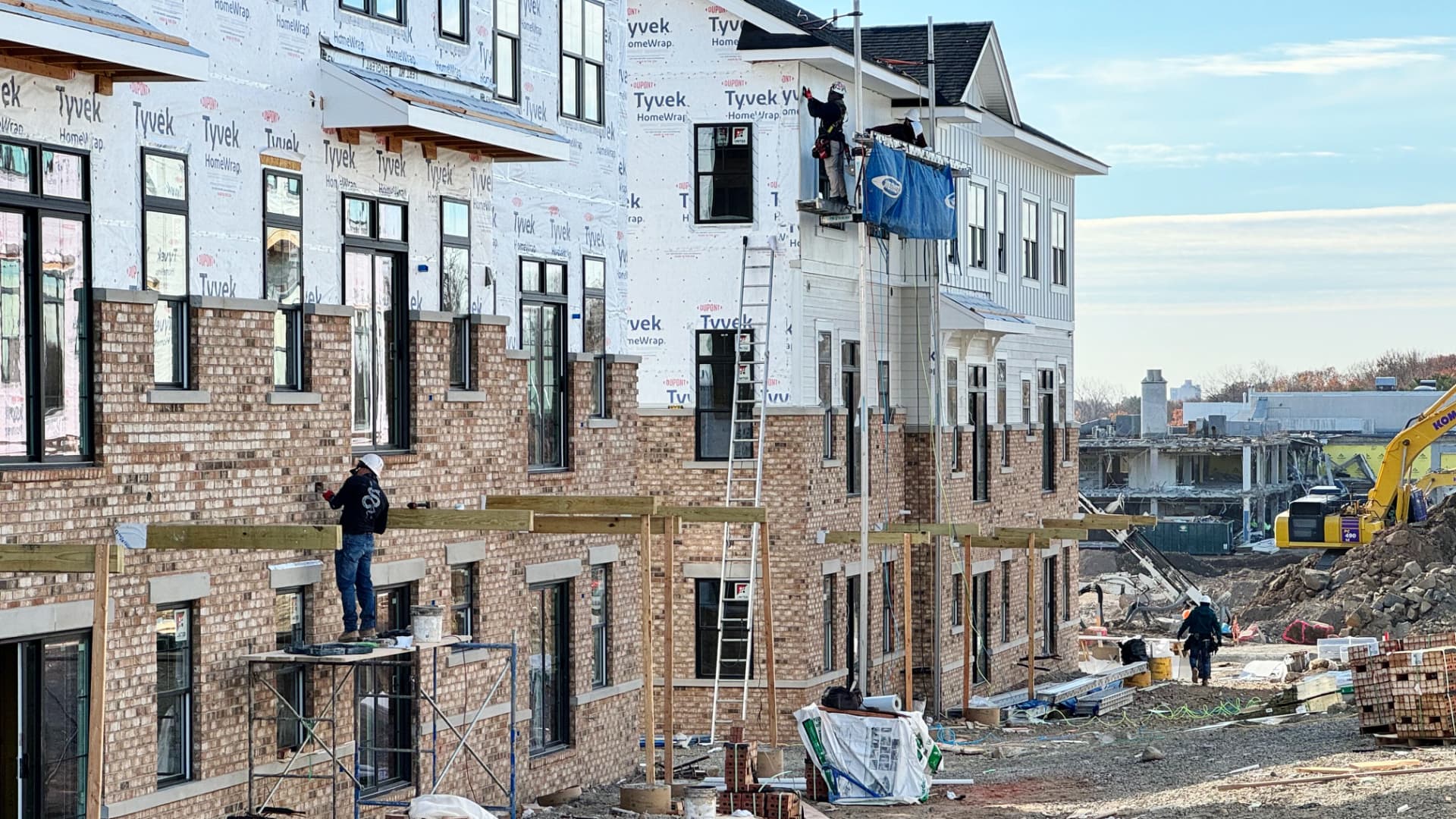Homes under construction in Englewood Cliffs, New Jersey on Nov. 19th, 2024.
Adam Jeffery | CNBC
If President-elect Donald Trump is going to push inflation back down to a more tolerable level, he will need help from housing costs, an area where federal policymakers have only a limited amount of influence.
The November consumer price index report contained mixed news on the shelter front, which accounts for one-third of the closely followed inflation index.
On one hand, the category posted its smallest full-year increase since February 2022. Moreover, two key rent-related components within the measure saw their smallest monthly gains in more than three years.
But on the other hand, the annual rise was still 4.7%, a level that, excluding the Covid era, was last seen in mid-1991 when CPI inflation was running around 5%. Housing contributed about 40% of the monthly increase in the price gauge, according to the Bureau of Labor Statistics, more than food costs.
With the CPI annual rate now nudging up to 2.7% — 3.3% when excluding food and energy — it’s not clear that inflation is consistently and convincingly headed back to the Federal Reserve’s 2% goal, at least not until housing inflation eases even more.
“It would be expected that over time, we would start to see year-over-year slower growth in rents,” said Lisa Sturtevant, chief economist at Bright MLS, a Maryland-based listing service that covers six states and Washington, D.C. “It just feels like it’s taking a long time, though.”
Still rising but not as fast
Indeed, housing inflation has been on a slow, uneven trek lower since peaking in March 2023. Much like the overall CPI, shelter components continue to rise, though at a slower pace.
The housing issue has been caused by ongoing cycle of supply outstripping demand, a condition that began in the early days of Covid and which has yet to be resolved. Housing supply in November was about 17% below its level five years ago, according to Realtor.com.
Rents have been a particular focus for policymakers, and the news there also has been mixed.
The average national rent in October stood at $2,009 a month, down slightly from September but still 3.3% higher than a year ago, according to real estate market site Zillow. Rents over the past four years are up some 30% nationally.
Looking at housing, costs also continue to climb, a condition exacerbated by high interest rates that the Federal Reserve is trying to lower.
Though the central bank has cut its benchmark borrowing rate by three-quarters of a percentage point since September, and is expected to knock off another quarter point next week, the typical 30-year mortgage rate actually has climbed about as much as the Fed has cut during the same time frame.
All of the converging factors post a potential threat to Trump, whose policies otherwise, such as tax breaks and tariffs, are projected by some economists to add to the inflation quandary.
“We know that some of the president-elect’s proposed initiatives are quite inflationary, so I think the prospects for continued progress towards 2% are less sure than they might have been six months ago,” Sturtevant said. “I don’t feel like I’ve been compelled by anything in particular that suggests that targeting the supply issue is something that the federal government can meaningfully do, certainly not in the short term.”
Optimism for now
During the presidential campaign, Trump made deregulation a cornerstone of his economic platform, and that could spill into the housing market by opening up federal land for construction and generally lowering barriers for homebuilders. Trump also has been a strong proponent for lower interest rates, though monetary policy is largely out of his purview.
The Trump transition team did not respond to a request for comment.
The mood on Wall Street was generally upbeat about the housing picture.
“Rents may finally be normalizing to levels consistent with 2% inflation,” Bank of America economist Stephen Juneau said in a note. The November housing data “will be viewed as encouraging at the Fed,” wrote economist Krushna Guha, head of central bank strategy at Evercore ISI.
Still, shelter expenses “continue to be the number one source for higher prices, and that the rate of increase has slowed is no comfort,” said Robert Frick, corporate economist at Navy Federal Credit Union.
That could cause trouble for Trump, who faces a potential Catch-22 that will make easing the housing burden difficult to solve.
“We’re not going to drop rates until shelter costs come down. But shelter can’t come down until rates are lower,” Sturtevant said. “We know that there are some wild cards out there that we might not have been talking about two or three months ago.”

 Accounting1 week ago
Accounting1 week ago
 Economics1 week ago
Economics1 week ago
 Personal Finance1 week ago
Personal Finance1 week ago
 Accounting1 week ago
Accounting1 week ago
 Finance1 week ago
Finance1 week ago
 Economics1 week ago
Economics1 week ago
 Economics1 week ago
Economics1 week ago
 Economics1 week ago
Economics1 week ago






















